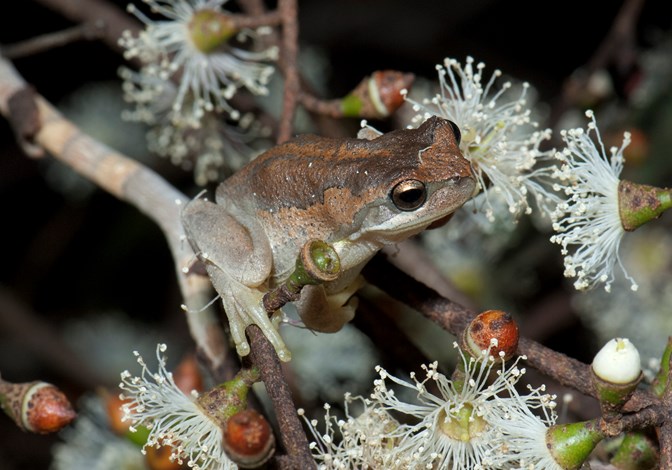Scientists reveal bushfires cause a decrease in the genetic diversity of Victoria's frog populations
Kermit was right when he sang it’s not easy being green.
Your mother may have told you, you’ve got to kiss a few frogs before finding your prince. In Victoria’s frog populations, researchers have discovered you might have to kiss more than a few frogs before finding someone who’s not, in fact, your cousin.
A study published today in the Journal of Applied Ecology shows that the increasing intensity and frequency of bushfires is having a significant impact on the genetic diversity of Victoria’s frog populations.
Having genetic diversity in frogs is important because it is key to breeding strong and healthy frogs that have the ability to adapt to environmental changes, such as shifts in temperature, rainfall and in this case, bushfires.
This genetic erosion results in increased levels of inbreeding and a decline in effective population size (the number of adults in a population who contribute offspring to the next generation) leading to frog populations being at increased risk of extinction.
As Jane Melville, Senior Curator, Terrestrial Vertebrates, Museums Victoria said:
"It is disturbing that these once common and abundant frogs are so significantly impacted by bushfires. Frogs could be in real trouble in south-eastern Australia with bushfires expected to increase in both frequency and intensity with climate change."
Amphibians are particularly vulnerable to changing environmental conditions, in fact currently up to 40% of species are facing extinction from multiple threats.
In the past thirty years, bushfires have increased in both frequency and intensity in Australia and climate change models predict that this will further escalate. However our understanding of the impacts this trend has had on frogs has been poorly understood - until now.
Following the catastrophic Black Saturday bushfires which tore through the Kinglake region in February 2009, a team of scientists from Museums Victoria and the University of Melbourne, who had started surveying the area for frogs two years prior, began to investigate the bushfires’ effect. They studied two particular kinds of frogs, the Southern brown tree frog (Litoria ewingii) and the Plains brown tree frog (Litoria paraewingi).
Early count and acoustic surveys (based on frog calls) indicated there had only been a small decline in the number of breeding males in the region – suggesting that the frog species hadn’t been affected by the Black Saturday bushfires and were therefore well adapted to such ecological disturbances.
However, the genetic data revealed an alarmingly different picture.
It showed that the effective population sizes of both species of frog had decreased, and that the frogs had become more inbred in the years following the fires. In fact, the Plains brown tree frog showed an increase in inbreeding of approximately 139% and the effective population size of the Southern brown tree frog decreased by 98% immediately following the fire.
With the predicted increase in bushfires and less resilient populations of frogs, we may be looking at a very gloomy future for our frog populations. Modelling within the study indicated that there was an 80% probability that a population of Victorian tree frog could become extinct if subjected to 10 intense fires per 100 years.
So what can be done with these findings?
The recommendations are clear. Jane Melville says:
"This new understanding of how bushfires effect the persistence of frogs in the Victorian environment should be used by authorities to help them make informed decisions about land management. Fire authorities should carefully consider the timing of controlled burns and conservation efforts after fires should focus on providing frogs with the ability to move across the landscape to re-established genetically healthy populations."
Interviews with Jane Melville, Senior Curator, Terrestrial Invertebrates, Museums Victoria and Dominque Potvin, Postdoctoral Scientist, Australian National University.
For interviews and images please contact:

